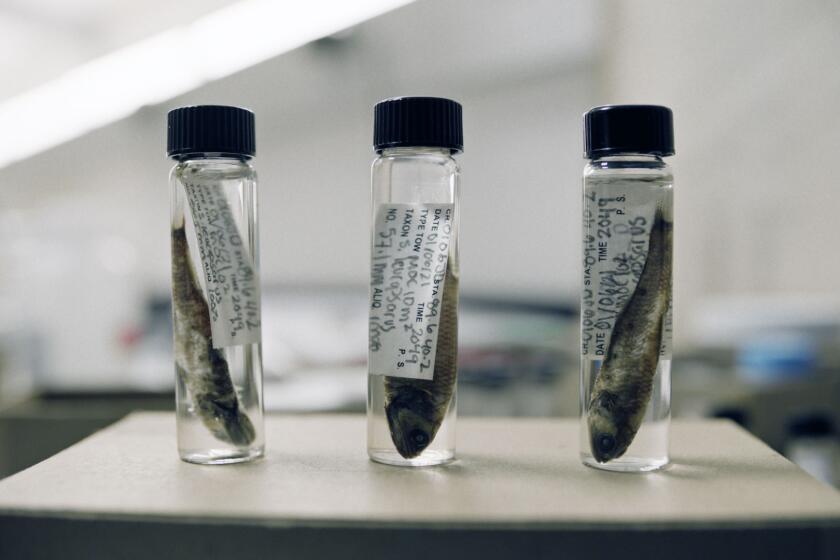Greyhound Dog Research at UCLA Attacked, Backed
A national animal rights group, which succeeded in stopping animal experiments at two Northern California research centers, is claiming that UCLA is among institutions in California and Arizona that obtained hundreds of greyhound dogs that were not supposed to be used for research.
In Defense of Animals maintains in a lawsuit that the dogs had been obtained fraudulently and either sold or given to UCLA and the other institutions for use in animal experiments even though the dogs’ former owners had not given their consent.
UCLA officials insist they obtained the dogs legitimately and deny any wrongdoing. Their statements are bolstered by an Arizona veterinarian who has examined greyhound dogs headed for research centers--including those at UCLA--and insists the controversy is all the result of a misunderstanding.
Gary Yocham, a Phoenix-based veterinarian, said each year thousands of greyhound dogs no longer able to compete in racing are abandoned by their owners. No one seems to know exactly how many dogs end their racing careers each year. But a spokeswoman for a national greyhound registry said it newly registers about 47,000 greyhounds each year.
Yocham said owners often tell the trainers either to find a home for the retired dogs as pets, or to humanely destroy them because they no longer want the expense of maintaining them.
Finding homes for the dogs frequently proves difficult, he said, so trainers often choose to sell or donate them to research rather than have them destroyed. Yocham acknowledged that in many cases the owner’s have not directly consented to allowing their dogs to be used for research. But neither have they specifically requested that they not be used for that purpose, he added.
“Communication between owners and trainers has never been that tight,” Yocham said.
Researchers use a variety of animals for their experiments. But they particularly favor greyhounds because their bone structure is similar to that of humans, they are readily available and their breeding makes them docile.
A spokeswoman for the San Rafael-based animal rights organization said her group has found many former owners who have objected to their dogs being used for research. The group successfully stopped experiments on greyhounds at Letterman General Hospital at the Presidio in San Francisco last fall and at UC Davis earlier this year. In both of those cases, the organization discovered that the dogs had been purchased from an Arizona vendor named Gregory Ludlow, who voluntarily surrendered his license to federal authorities.
The group was able to trace many of the original owners of the dogs through numbers tattooed on the dogs’ ears. In nearly all of the cases, the owners said they had no knowledge that their dogs had been turned over for research, said Susan Netboy, director of In Defense of Animal’s Greyhound Rescue Project.
On July 10, the group filed suit against Harrington Arthritis Research Center in Phoenix, alleging that the center also had obtained stolen dogs from Ludlow.
Terry Ashoff Johnson, a spokeswoman for Harrington, said the center has agreed to halt the research until an independent inspection of the animals is completed. The center’s own investigation, however, resulted in the release of only two of about 70 dogs in question. Johnson said they believe the remaining animals have been legally obtained.
Ludlow could not be reached for comment.
The experiments being done on the greyhounds are legal and all the research facilities have abided by federal regulations by obtaining the dogs through licensed vendors, the animal rights group acknowledges.
The UCLA experiments in question involve four greyhounds being used to test artificial hip implants.
The research, according to a spokesman, involves surgically implanting the artificial hips under general anesthesia and monitoring the dogs for six to 18 months, with periodic X-rays to evaluate how the bone is growing into the implants.
At the end of the monitoring period, the dogs are “euthanized,” and the hips are analyzed.
Earlier this week, a Santa Monica Superior Court Judge refused to issue a temporary restraining order to stop the research. Judge Irving Shimer, however, set a hearing for July 25 to determine if any of four dogs were donated without the owners’ consent.
The dogs were scheduled to be killed next week, but officials have agreed to delay any further action until after the court hearing.
Ruth Simon, a UCLA attorney, said two of the dogs were obtained from a licensed vendor and two others were donated by Yocham. She said she has documents proving the dogs were legally obtained, two of them from a dealer in Oregon. In the case of the dogs donated by Yocham, Simon said the owners had specifically consented to their use in the research project.
According to Netboy of the rights group, Cedars-Sinai Medical Center purchased greyhounds from Ludlow in fall, 1988, and killed them three weeks later as part of a biomedical research project. Netboy said she spoke with owners of seven of the 20 dogs obtained by the medical centers and said that none had given permission for their dogs to be sold for research.
UC San Diego also purchased two dogs from Ludlow in June, 1989. One of the dogs was killed a month later, the second was killed in August, according to Netboy. She said the original owners of those dogs were traced and neither had known the dogs were sold for research.
Officials at both Cedars-Sinai and UC San Diego have said the dogs were obtained legally.
Meanwhile, officials of the National Greyhound Assn. in Abilene, Kan., which operates a greyhound registry and certifies the dogs for racing, is notifying dog owners nationwide of the problem in an effort to clear up any misunderstanding.
Gloria Sanders, a member of the association’s board, said owners generally do not follow up on what happens to their dogs after their racing careers are over. She said she is pushing for owners to obtain a written statement from trainers about how their dogs have been used.
She disputes that it is difficult to place greyhounds as pets. She said more than 5,500 former racing greyhounds are annually placed in homes by a greyhound pet group.
More to Read
Start your day right
Sign up for Essential California for news, features and recommendations from the L.A. Times and beyond in your inbox six days a week.
You may occasionally receive promotional content from the Los Angeles Times.






